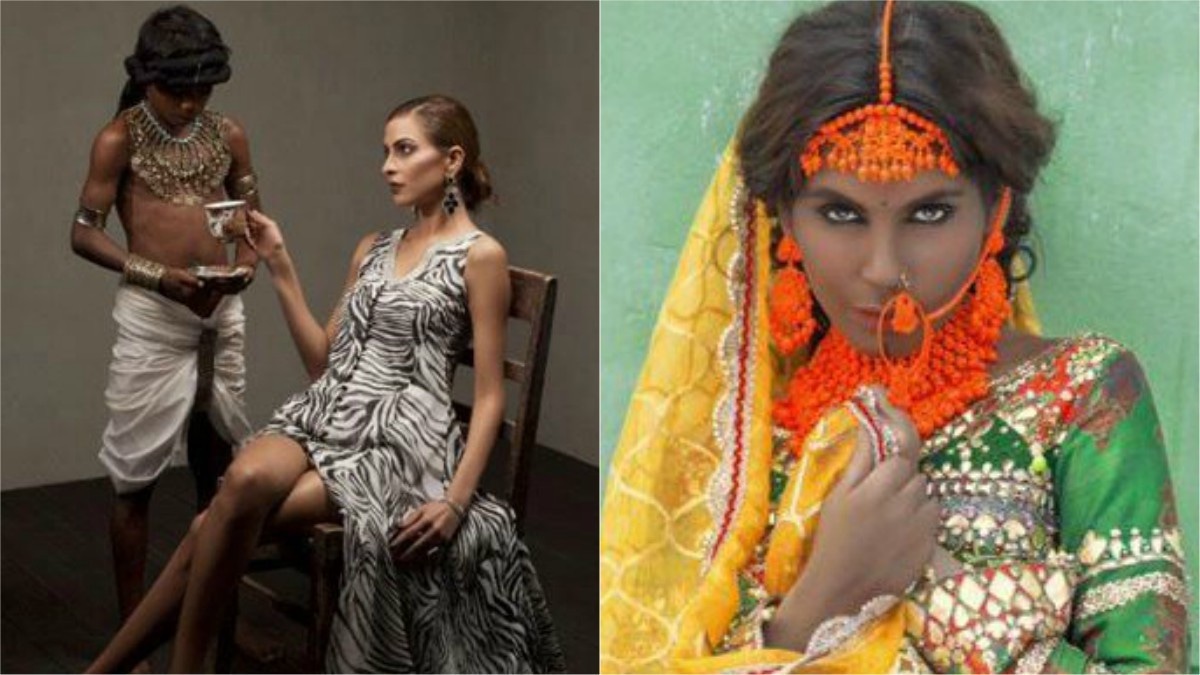Upcoming fashion photographer Alee Hassan has been on the right track.
With edgy editorials and a Lux Style Award for best emerging talent under his belt, he'd been making waves for all the right reasons... until now.
Yesterday, Hassan posted a shot of his "muse" Anam Malik and well, it's pretty clear that it's cross-cultural pollination gone wrong.

What may have seemed like a harmless creative decision to Hassan has resulted in him being slammed online for attempting to make a fashion statement by mocking an entire race.

Outrage also came from within the industry, such as from fellow photographer, Jaffer Hassan, who appeared to be alluding to this photo shoot.

Talking to Images, Alee didn't seem to be too bothered by all the reproval; "I'm not trying to criticise any race or origin. My style is about transformation, I work with colours and textures. Like I made the costumes in this shoot with plastic sheets styled to look like high fashion," he says.
"I don't want to enter into a big debate on this. A lot of people have also left positive feedback under the picture. I will be posting a Facebook status later addressing any criticism," he adds.
Intentional or not, one can't deny that the image seems to have disturbed many and looking at the shoot, we understand why: it is in bad taste and clearly racially insensitive. A form of theatrical makeup which gained popularity back in the early 19th century, blackface was used by white people to demean and degrade African Americans and purport stereotypes about them. Its use in the modern day is not something to be taken lightly.
While Alee may have been the latest to display such ignorance, he's certainly not the first; this seems to be a common trend in Pakistan's fashion fraternity.
In 2013, designer Aamna Aqeel was criticised for a photoshoot titled "Be My Slave" which appeared to glamourise child labour. Ali Xeeshan's campaign in 2015 featured an otherwise light-skinned Amna Babar made up in a heavily tanned look; ironic for a photo shoot that purportedly meant to embrace (natural) dusky beauty.

In 2017, we shouldn't have to explain to celebrities or the fashion world why blackface is offensive but we're going to give it a shot anyway since evidently they could use some guidelines.
So to all photographers (and models/makeup artists who go along with this!), here are a list of questions you should ask yourself if you'd like to be creative WITHOUT crossing the line into offensive territory:
No history is best forgotten, however uncomfortable it may be to remember.
As mentioned earlier, blackface is not something to be taken casually; it is rooted in the historical oppression of African Americans and glamourising it for an editorial is just not acceptable. It is insulting because it is a caricature of a black person, exaggerated to reinforce racist perceptions.
So how about we try not to throw political correctness and basic human decency out the window just for a laugh or an editorial?
If yes, why not just hire them instead of the supermodel of the day?
It's not like it's slim pickings out there; there's plenty of (relatively) dusky models to choose from such as Aamna Ilyas, Iraj and Fayezah Ansari to name a few.
In a culture and society that is obsessed with fair skin, slip-ups like this only fuel a regressive mindset. It's borderline insulting to pick up a fair-skinned model and paint her to look dark rather than give naturally dark-skinned models a chance.
What could've been a shoot challenging stereotypes is instead now a sad reminder of how we as people of colour still don't get how racism works, and of how dark-skinned talent is still consistently underutilised and sidelined even in projects that claim to celebrate their skin tone.
To adopt an all-things-go approach in fashion is not what should be promoted. We're not saying that you have no room to be experimental in the creative arts but there are some boundaries one must adhere to to be responsible.
For ages, the entertainment industries have long upheld the idea that blackness and all that it means to be black is valuable but just without the real black canvas, that is only when it's appropriated.
When it comes to appropriation, the debate always focuses on a dominant culture borrowing from a minority. That being said, just because we are people of colour doesn't make it okay for us to mock other minorities.
It hits particularly close to home when people who can't practice their culture freely, like many African Americans who feel oppressed, are hit in the face with privileged people getting away with the same practices under the garb of fashion. Like Greg Tate says, they get to wear "everything but the burden". It's yet another incident of when a person thinks it's amusing to dress up as a black person, when black people don't have that sort of luxury.
Case in point of "acceptable" black beauty? The Kardashians are envied for their big lips (via fillers) yet black women are ridiculed for the same, natural feature. Need we say more?
So to wrap up, what have we learnt from this? Just do your homework.
Alee Hassan has since taken to Facebook to address these criticisms.
Comments